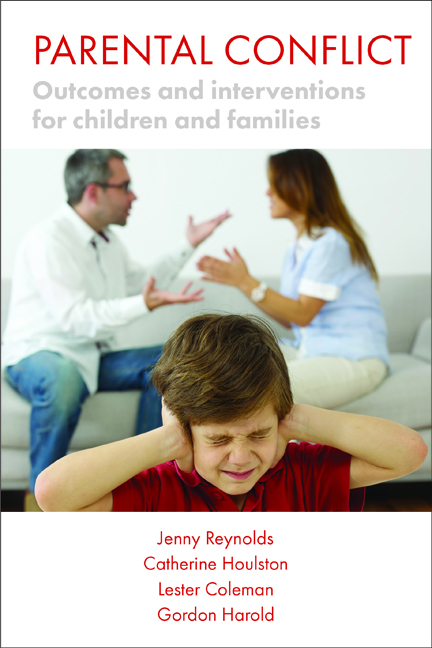Book contents
- Frontmatter
- Contents
- Foreword
- Preface
- 1 Conflict in context
- 2 Understanding different types of conflict
- 3 The impact of inter-parental conflict on children
- 4 How does inter-parental conflict affect children?
- 5 Risk and resilience: why are some children affected more than others?
- 6 Review of conflict-based interventions for couples
- 7 Implications for practice: How to help families
- 8 Conclusions and recommendations
- References
- Index
3 - The impact of inter-parental conflict on children
Published online by Cambridge University Press: 04 February 2022
- Frontmatter
- Contents
- Foreword
- Preface
- 1 Conflict in context
- 2 Understanding different types of conflict
- 3 The impact of inter-parental conflict on children
- 4 How does inter-parental conflict affect children?
- 5 Risk and resilience: why are some children affected more than others?
- 6 Review of conflict-based interventions for couples
- 7 Implications for practice: How to help families
- 8 Conclusions and recommendations
- References
- Index
Summary
There exists a long standing and wide ranging body of evidence, going back over 30 years, documenting children's reactions to parental conflict (for reviews see Cummings and Davies, 1994; Grych and Fincham, 2001). This includes evidence collected using experimental, longitudinal, and naturalistic approaches to data collection, as children watch recordings of adults arguing or give their reactions to different scenarios) under carefully controlled experimental conditions (e.g. Davies et al., 2006). It also includes data from interviews with, or questionnaires completed by, parents, children and teachers (Cummings et al., 2002; Cummings et al., 2003). This involves children, parents and families being followed for long periods of time (longitudinal studies; see Harold and Conger, 1997), or other innovative means of obtaining children's views, such as using puppets (Ablow and Measelle, 2009), as well as diary accounts and observational studies (Crockenberg et al., 2007).
Together the data demonstrate that, in general, children are highly sensitive to parental conflict and their distress is apparent from an early age; as early as six months old according to some studies (Cummings and Davies, 1994; Harold et al., 2004; Crockenberg et al., 2007; Moore, 2010). Children's distress is apparent in facial expressions, gestures and actions indicating fear and anxiety, in biological regulatory processes i.e. how the body and brain respond to stressful situations (Van Goozen et al., 2007; Davies et al., 2008; El-Sheikh and Erath, 2011), and in their own accounts where children talk about being angry, sad, frightened or responsible (Smart et al., 2000; Dunn and Deater-Deckard, 2001). Children may also have different emotional responses to conflict depending on the nature of the dispute. For example, one study found children react to escalating and unresolved conflict with fear, while escalating conflicts about child-rearing provoke anger and sadness (Koss et al., 2011). This chapter looks at how these immediate responses translate into long-term difficulties for children who are exposed to destructive conflict between parents.
Emotional regulation: externalising and internalising problems
Two of the most well-established and most common outcomes for children are internalising (emotional) and externalising (behavioural) problems respectively (Cummings and Davies, 1994; Grych and Fincham, 2001). Over the last decade research has built on this large body of work and sought to identify the mechanisms underlying the link between inter-parental conflict and children's internalising and externalising symptoms respectively (see Davies et al., 2002; Davies et al., 2004; El-Sheikh et al., 2008).
- Type
- Chapter
- Information
- Parental ConflictOutcomes and Interventions for Children and Families, pp. 23 - 32Publisher: Bristol University PressPrint publication year: 2014



